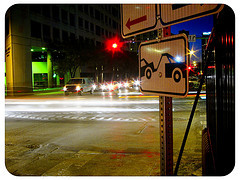Tow Company Employee Comes Out In Favor Of Price Caps

(nffcnnr)
W. is a dispatcher for a towing company in Arizona who reached out to Consumerist after seeing yesterday’s story.
He feels that the private property impound (PPI) business — those companies that tow vehicles out of private lots at the request of the property owners — “is a service that needs good consumer protections as very shady practices plague them.”
Unlike the Seattle tow operators, who argue that caps on towing and impound rates need to be set by the state and uniform statewide, W. says he believes that every city should have the right to decide on a fair rate for its citizens, and that states should set a cap to protect consumers in areas where the local municipality hasn’t determined a rate limit.
In Washington, tow operators are only required to provide the state with their rates; the state does not currently regulate tow costs, meaning some people are paying anywhere from $800 to $2,000 for parking in the wrong spot.
As for the plaintiff companies’ argument that allowing Seattle to cap rates would mean that tow operators would suddenly have to deal with every town and city in the area having their own limits and regulations on towing, W. says that’s all much ado about nothing.
“Here in Arizona, greater Phoenix area, we have four different cities each with a different PPI rate, and the rest are protected by a statewide cap,” he writes. “My company has contracts in every one of those cities, as well as police contracts that each have different rates and regulations, commercial contracts with different rates and requirements from those companies, and private tows with different rates depending on the service, vehicle type, etc. If these companies cant handle different rates, they are poorly run, and deserve the headache.”
In Arizona, PPI is capped at $200 for the two with no charge for the mileage and no hourly charge for towing, says W. Then there are various city-specific caps — Tempe is $120, Phoenix is $105 and Scottsdale is $75.
Yes, that might be a lot to just keep in your head, but W. points out that when he’s working, “all I have to do is look at the wall and the rates are posted right there. Even if these companies use paper files to track their impounded vehicles, how hard would it be to match the city it was towed from to a piece of paper stating the rates for their city? They can make any excuse they want, the bottom line is that they want to keep the right to charge outrageous amounts for impounds.”
Thanks to W. for sharing his insider insight. If you have helpful advice or information that you’ve gleaned from on-the-job experience, let us know at tips@consumerist.com.
Want more consumer news? Visit our parent organization, Consumer Reports, for the latest on scams, recalls, and other consumer issues.

